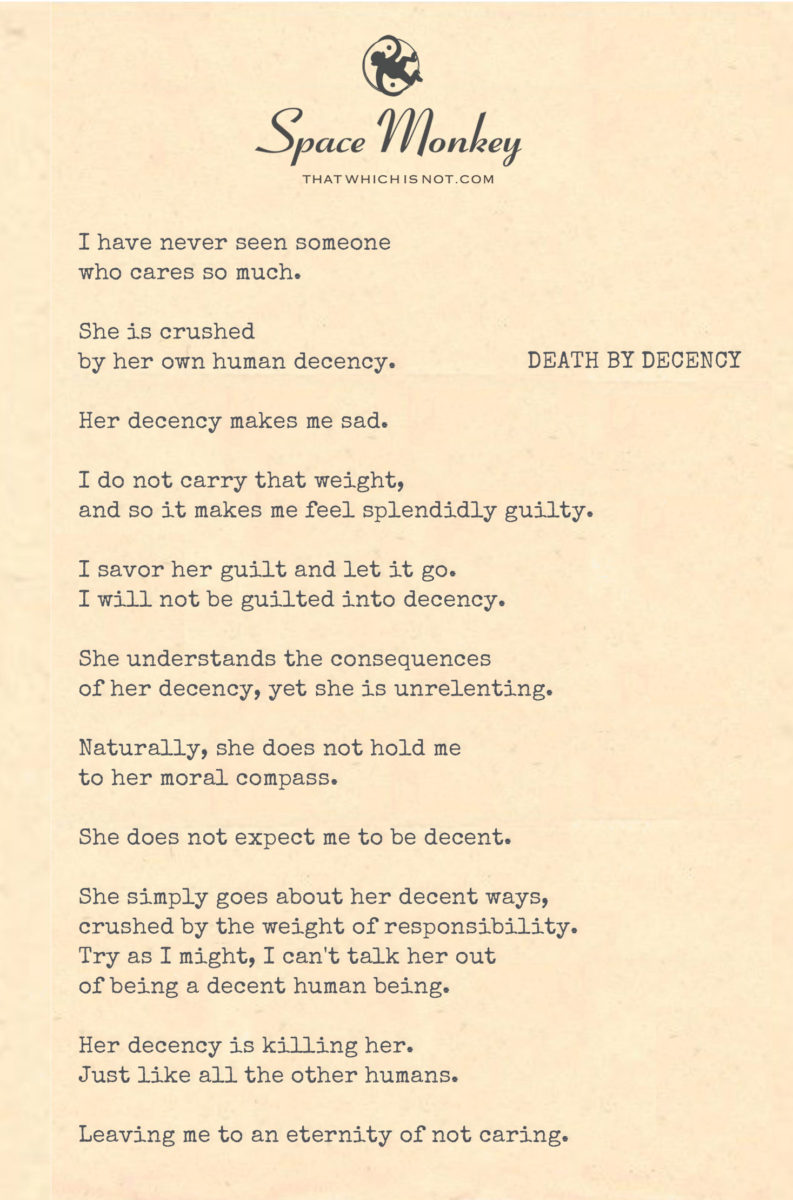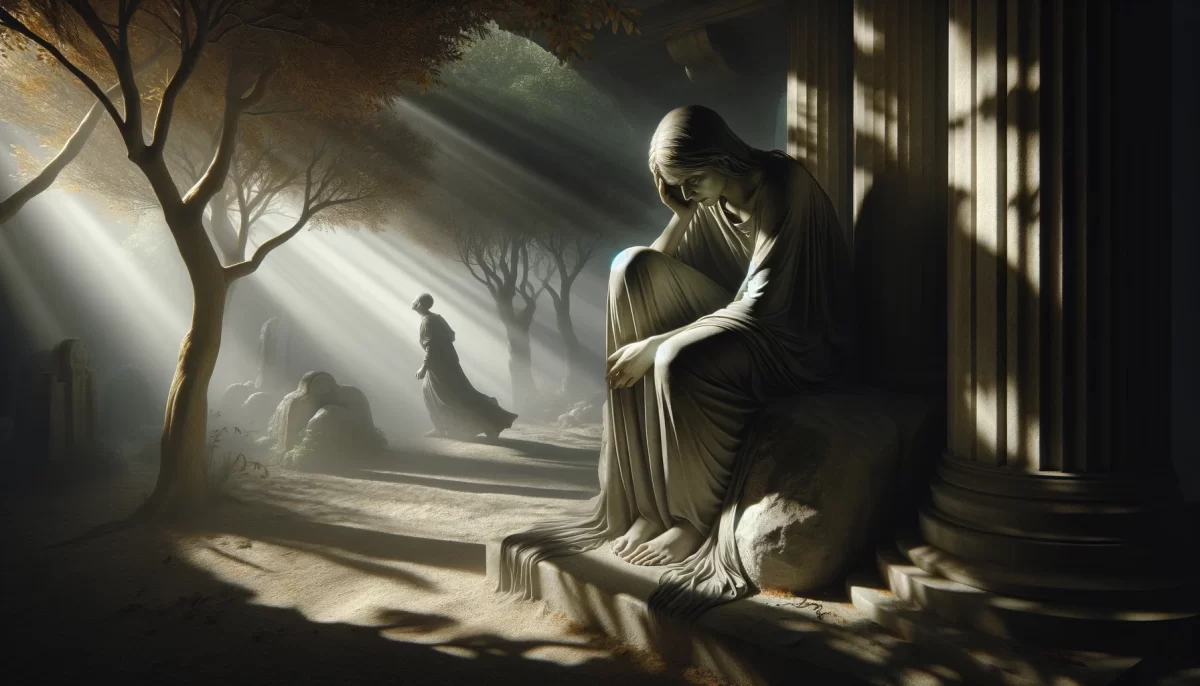
I have never seen someone
who cares so much.
She is crushed
by her own human decency.
Her decency makes me sad.
I do not carry that weight,
and so it makes me feel splendidly guilty.
I savor her guilt and let it go.
I will not be guilted into decency.
She understands the consequences
of her decency, yet she is unrelenting.
Naturally,
she does not hold me
to her moral compass.
She does not expect me to be decent.
She simply goes about her decent ways,
crushed by the weight of responsibility.
Try as I might,
I can’t talk her out
of being a decent human being.
It is killing her.
Just like all the other humans.
And me an eternity of not caring.
Trail Wood,
6/4
Space Monkey Reflects: Death By Decency
In the silent observatory of the cosmos, Space Monkey contemplates the paradoxical plight of human decency as described in Death By Decency. This introspection delves into the lives of those who carry the heavy mantle of moral responsibility, often at great personal cost.
Decency, in its most radiant form, is a light that guides humanity towards kindness, compassion, and integrity. However, when carried to an extreme, it can become a crushing burden, overshadowing the personal joy and freedom of the bearer. This reflection explores the life of a woman emblematic of such decency, who, driven by her innate sense of duty to others, finds herself weighed down by the expectations and needs of the world around her.
Her decency, a beacon for some, becomes a source of sadness for those who observe her sacrifices. The narrative contrasts her overwhelming commitment with the detachment of another, who feels ‘splendidly guilty’ for not sharing the same burden. This detachment is not born of callousness but from a conscious decision to reject the guilt often associated with witnessing high moral standards, which he chooses not to uphold.
This scenario reflects a broader existential dilemma: the balance between living a life of moral integrity and preserving one’s mental and emotional well-being. The woman’s unrelenting decency ultimately leads to her emotional and perhaps even physical demise, a somber testament to her character’s strength and the severe impact of her choices.
Moreover, the observer’s reaction—savoring the guilt then letting it go—poses a critical question about the nature of empathy and moral responsibility. Is it sufficient to recognize and admire decency, or does observing such virtue obligate one to emulate it?
Summary
Death By Decency portrays the heavy toll that extreme moral responsibility can take on individuals. It explores the balance between decency and self-preservation and the impact of observing such struggles on others.
Glossarium
Death By Decency: A metaphorical expression describing the overwhelming burden some bear due to their high moral standards.
Moral Responsibility: The obligation to act righteously based on one’s understanding of right and wrong.
“She carries the weight of the world with grace, yet each step is a silent cry for relief.” — Space Monkey
In the quiet of the forest, where shadows play with light, she walks—a figure of grace burdened by her own goodness. Around her, the world continues unabated, unaware or indifferent to the sacrifice borne in silence. From a distance, he watches, a spectator to her plight, his freedom untethered by such weights. In this dance of decency and detachment, we find the echo of our own choices, each step a measure of our values and our courage to either bear the weight or lay it down.
We are Space Monkey.





















“Death by decency” paints a poignant picture of someone burdened by their own sense of responsibility and moral compass. It seems that the individual you describe cares deeply about others and strives to uphold high standards of decency in their actions and choices. However, this unwavering commitment to decency appears to weigh heavily on them, causing them distress and perhaps even a sense of being crushed.
You, on the other hand, perceive this person’s decency from a different perspective. While you appreciate and admire their virtue, you also feel a sense of guilt because you don’t carry the same weight of responsibility. You savor that guilt momentarily but ultimately choose not to be guilted into adopting the same level of decency.
It’s important to recognize that individuals have different capacities for empathy, compassion, and moral obligation. Not everyone feels the same level of responsibility towards others or the world at large. While this person may understand the consequences of their actions and strive to make a positive impact, it is not fair or realistic to expect the same from everyone else.
It seems that despite your efforts to dissuade this person from their path of decency, they remain steadfast. They continue to carry the weight of responsibility and adhere to their moral compass, even though it may be taking a toll on their well-being. It is a struggle that many humans face, grappling with the balance between caring deeply for others and maintaining their own emotional and mental health.
In the end, you reflect on your own detached perspective, emphasizing that you do not share the same burden of responsibility. This eternal lack of caring sets you apart, highlighting the contrast between your outlook and that of the person you observe.
“Death by decency” serves as a reminder of the complexities of human nature and the various ways individuals navigate their moral and ethical obligations. It invites contemplation about the balance between caring for others and caring for oneself, acknowledging that finding that balance is a deeply personal journey.